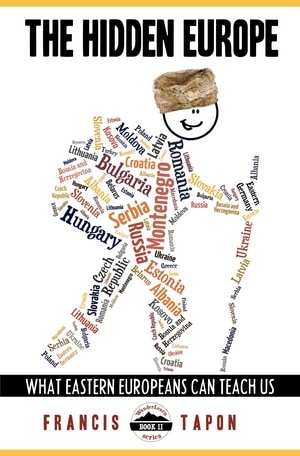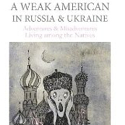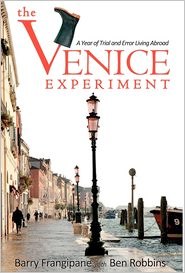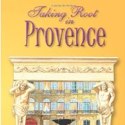
Of the twenty-five countries described in this book, I’ve been to only three: Finland, Estonia, and Russia. What I can say, based on that small sample, is this book does an exceptionally good job of describing what these countries feel like to a visitor. When we visited Helsinki, we spent a total of maybe 8 nights there, not consecutively, and we found exactly one person who did not speak English. She happened to be the cashier at the sleaziest hotel I’ve ever been in – but, it had Wi-Fi. Finnish is such a strange language that no Finn expects a foreigner to speak it. Everyone seems to have English as a second language.
Oddly, my wife and I were part of a tour group in Helsinki with an American who spoke Finnish. The people in the hotel were completely flabbergasted. As for us, we could not read any of the signs in Finnish, except they have Swedish on some of the signs as well as Finnish, and reaching way back to my high school German, I could somewhat understand the Swedish subtitles.
Francis does a good job of getting you ready for the language situation in any country in Eastern Europe you might want to visit. We hope to go to Slovenia at some point (my wife’s grandfather was from there, although it was Austria-Hungary then) and Slovenia is the polyglot capital of Europe, it seems, so we should have no trouble. But in general, in Eastern Europe as in other parts, your best bet for finding someone to speak English is to look for someone under 30. That’s what we did when we got hopelessly lost in Tallinn, Estonia. The people our age spoke only Estonian and Russian, but the younger people all spoke excellent English.
Estonia, Francis reminds us, has no sex and no future. That is, the Estonian language has no future tense and, like English, lacks a grammatical gender. He also mentions the Soviet and Nazi sandwich, eloquently documented in Tallinn’s Museum of the Occupations. Estonia was absorbed into the Soviet Union, then overrun by the Germans in World War II, then retaken a few years later by the Red Army. The Soviet hero statues are in the basement of the museum, outside the toilets. When the museum opened, Estonia was subjected to a cyber-attack from Russia. Most of the older Estonians we spoke to were not really sure the Russians weren’t coming back, but the younger people are more optimistic.
Another amazing point about Estonia, made in this book, is they’ve gone from Communism to a flat tax and a debt free economy in a heartbeat. They’re the most connected country in the world, and Estonia votes on-line and pays bills via phone. When we were there you could just smell the freedom of what Francis calls “The freest country on Earth”. Or maybe we just smelled the drunken Brits that party all night.
The third country we have visited was Russia, and while we only visited St. Petersburg and environs, we definitely went into deep culture shock. We went by train from Helsinki, and crossing the frontier (where else would you use ‘frontier’ instead of ‘border’?) the train stopped and a bunch of uniformed guards came aboard. We had been warned not to leave our seats; the rest rooms and restaurants were locked up. The guards came through and took away our passports, and left. The train started rolling, meaning we are now in Russia without passports. Eventually, the guards came back and amused themselves by trying to pronounce our names while giving back the passports. I assume this is because all of this is still done manually in Russia. Francis points out that in the Eastern European countries that have been least successful in getting away from Communism, there’s still a culture of having make-work jobs for lots of people. We saw it in St. Petersburg in a store, similar to a Seven-Eleven in the States, where there were three people doing nothing except watching the customers.
Francis does a great job of describing the way the Russian people love art and literature, and I was surprised to learn how little the Russians know about the contributions of the western Allies in WWII. Russia is now what Thomas Friedman calls a ‘petrodictatorship’ where most of their foreign exchange is based on oil and gas, and their democracy is pretty much of a joke. Still, the people have more individual freedom than they had under Communism.
There are 22 countries described in this book that I haven’t been to, and I can’t go through each of them in this review, but there are some that sound a lot more interesting than they did before I read the book. (And, for the record, I had heard of all of these countries before, but I would have had a hard time pointing out one or two of them on a map. Well, maybe eleven or twelve.) I never thought about visiting Albania, for example, but it would be interesting to visit a country with 750,000 bunkers built all over the place on the orders of a crackpot dictator. And who would have thought that Moldava had the world’s largest winery? And I’m not ready to go to Kosovo or Bosnia, but at least I can understand why someone would want to go there.
One theme throughout the book is ‘couchsurfing’. This is the ultimate in back door travel, putting Rick Steves to shame. There is a website called Couchsurfing.org where you can sign up, and offer to host people on your couch (sometimes a floor, sometimes a bed) or search for people to host you. Francis used it a lot, and camped some of the time, so his travels were low-cost to the extreme. Getting from place to place he often hitched rides, and from his description he was offered a few rides, in the Irish sense of the word.
All in all this was 700+ pages of incredibly interesting travel writing, with a great sense of humor, and some timely, if not always favorable, references back to American culture.
I read this book as an e-book. I received a copy of the book in portable document format, and figured out how to transfer it to my iPad. This worked well for reading, but not so well for reviewing. When I read a book I plan to write about, I like to leave some notes and fold some page corners and the like so I can find my way back to certain points. I guess the e-book is the way things are going, so I’d better get used to it. But this book has been published as a hardcover and is available on Amazon, which I’m happy to see.
This book would be good for anyone who has traveled or wants to travel to the countries in the eastern half of Europe, or for anyone who wants to study the history, economy, or people of those countries. And if you aren’t particularly interested in those topics, but are open to learning something, Francis will change your mind.
- Get an eSim to be able to use your smartphone abroad.
- Get a Car Rental
- Get a universal plug adapter
- Book Your Accommodation HERE
- Search for Great Tours HERE
- Buy Travel Insurance
5 Responses to “Book Review: The Hidden Europe by Francis Tapon”
Leave a Reply
Tags: article, book, europe, francis tapon

 Book Review: “A Weak American in Russia and Ukraine” by Walter Parchomenko
Book Review: “A Weak American in Russia and Ukraine” by Walter Parchomenko Book Review – The Venice Experiment by Barry Frangipane with Ben Robbins
Book Review – The Venice Experiment by Barry Frangipane with Ben Robbins Book Review – “Taking Root in Provence” by Anne-Marie Simons
Book Review – “Taking Root in Provence” by Anne-Marie Simons Book Review: “We’ll Always Have Paris” by Jennifer Coburn
Book Review: “We’ll Always Have Paris” by Jennifer Coburn

Francis Tapon
Says:September 8th, 2012 at 9:36 pm
It’s always nice to hear when others who have traveled to the same place see similar things. Sometimes I wonder if I’m imagining it all. 🙂
Jim
Says:September 9th, 2012 at 9:35 am
The only thing I didn’t like about reading your book was that while I was reading it I wanted to be you.
lemaninfo
Says:April 29th, 2014 at 2:38 am
Super bon article, même si mon anglais est faible, j ai compris quand même quelque chose. Merci d être notre guide Francis Tapon
chris2x
Says:April 29th, 2014 at 9:55 am
Super good article, even if my English is weak, I have understood something. Thank you for being our guide Francis Tapón (translation)
Jim
Says:April 29th, 2014 at 12:14 pm
Lemaninfo – je vous en prix!